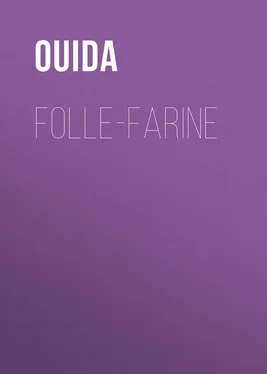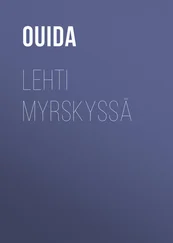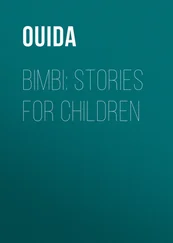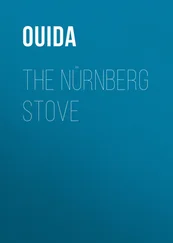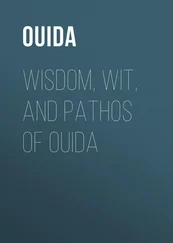Ouida - Folle-Farine
Здесь есть возможность читать онлайн «Ouida - Folle-Farine» — ознакомительный отрывок электронной книги совершенно бесплатно, а после прочтения отрывка купить полную версию. В некоторых случаях можно слушать аудио, скачать через торрент в формате fb2 и присутствует краткое содержание. Жанр: foreign_prose, literature_19, foreign_antique, на английском языке. Описание произведения, (предисловие) а так же отзывы посетителей доступны на портале библиотеки ЛибКат.
- Название:Folle-Farine
- Автор:
- Жанр:
- Год:неизвестен
- ISBN:нет данных
- Рейтинг книги:5 / 5. Голосов: 1
-
Избранное:Добавить в избранное
- Отзывы:
-
Ваша оценка:
- 100
- 1
- 2
- 3
- 4
- 5
Folle-Farine: краткое содержание, описание и аннотация
Предлагаем к чтению аннотацию, описание, краткое содержание или предисловие (зависит от того, что написал сам автор книги «Folle-Farine»). Если вы не нашли необходимую информацию о книге — напишите в комментариях, мы постараемся отыскать её.
Folle-Farine — читать онлайн ознакомительный отрывок
Ниже представлен текст книги, разбитый по страницам. Система сохранения места последней прочитанной страницы, позволяет с удобством читать онлайн бесплатно книгу «Folle-Farine», без необходимости каждый раз заново искать на чём Вы остановились. Поставьте закладку, и сможете в любой момент перейти на страницу, на которой закончили чтение.
Интервал:
Закладка:
"You knew, you knew, you knew!" she echoed, with a grin upon her face. "Oh, yes! you were so wise! Who said seven years through that Reine Flamma was a saint, and taken by the saints into their keeping? And who hissed at me for a foul-mouthed crone when I said that the devil had more to do with her than the good God, and that the black-browed gypsy, with jewels for eyes in his head, like the toad, was the only master to whom she gave herself? Oh-hè, you were so wise!"
So she mocked them, and they were ashamed, and held their peace; well knowing that indeed no creature among them had ever been esteemed so pure, so chaste, and so honored of heaven as had been the miller's daughter.
Many remembered the "gypsy with the jeweled eyes," and saw those brilliant, fathomless, midnight eyes reproduced in the small rich face of the child whom Reine Flamma, as her own father said, had borne in shame whilst they had been glorifying her apotheosis. And it came to be said, as time went on, that this unknown stranger had been the fiend himself, taking human shape for the destruction of one pure soul, and the mocking of all true children of the church.
Legend and tradition still held fast their minds in this remote, ancient, and priest-ridden place; in their belief the devil was still a living power, traversing the earth and air in search of souls, and not seldom triumphing: of metaphor or myth they were ignorant, Satan to them was a personality, terrific, and oftentimes irresistible, assuming at will shapes grotesque or awful, human or spiritual. Their forefathers had beheld him; why not they?
So the henhucksters and poulterers, the cider-makers and tanners, the fisherfolk from the seaboard, and the peasant proprietors from the country round, came at length in all seriousness to regard the young child at Yprès as a devil-born thing. "She was hell-begotten," they would mutter when they saw her; and they would cross themselves, and avoid her if they could.
The time had gone by, unhappily, as they considered, when men had been permitted to burn such creatures as this; they knew it and were sorry for it; the world, they thought, had been better when Jews had blazed like torches, and witches had crackled like firewood; such treats were forbidden now, they knew, but many, for all that, thought within themselves that it was a pity it should be so, and that it was mistaken mercy in the age they lived in which forbade the purifying of the earth by fire of such as she.
In the winter-time, when they first saw her, unusual floods swept the country, and destroyed much of their property; in the spring which followed there were mildew and sickness everywhere; in the summer there was a long drought, and by consequence there came a bad harvest, and great suffering and scarcity.
There were not a few in the district who attributed all these woes to the advent of the child of darkness, and who murmured openly in their huts and homesteads that no good would befall them so long as this offspring of hell were suffered in their midst.
Since, however, the time was past when the broad market-place could have been filled with a curious, breathless, eager crowd, and the gray cathedral have grown red in the glare of flames fed by a young living body, they held their hands from doing her harm, and said these things only in their own ingle-nooks, and contented themselves with forbidding their children to consort with her, and with drawing their mules to the other side of the road when they met her. They did not mean to be cruel, they only acted in their own self-defense, and dealt with her as their fellow-countrymen dealt with a cagote—"only."
Hence, when, with the reviving year the child's dulled brain awakened, and all the animal activity in her sprang into vigorous action, she found herself shunned, marked, and glanced at with averted looks of mingled dread and scorn. "A daughter of the devil!" she heard again and again muttered as they passed her; she grew to take shelter in this repute as in a fortress, and to be proud, with a savage pride, of her imputed origin.
It made her a little fierce, mute, fearless, reckless, all-daring, and all-enduring animal. An animal in her ferocities, her mute instincts, her supreme patience, her physical perfectness of body and of health. Perfect of shape and hue; full of force to resist; ignorant either of hope or fear; desiring only one thing, liberty; with no knowledge, but with unerring instinct.
She was at an age when happier creatures have scarce escaped from their mother's arms; but she had not even thus early a memory of her mother, and she had been shaken off to live or die, to fight or famish, as a young fox whose dam has been flung to the hounds is driven away to starve in the winter woods, or save himself, if he have strength, by slaughter.
She was a tame animal only in one thing: she took blows uncomplainingly, and as though comprehending that they were her inevitable portion.
"The child of the devil!" they said. In a dumb, half-unconscious fashion, this five-year-old creature wondered sometimes why the devil had not been good enough to give her a skin that would not feel, and veins that would not bleed.
She had always been beaten ever since her birth; she was beaten here; she thought it a law of life, as other children think it such to have their mother's kiss and their daily food and nightly prayer.
Claudis Flamma did after this manner his duty by her. She was to him a thing accursed, possessed, loathsome, imbued with evil from her origin; but he did what he deemed his duty. He clothed her, if scantily; he fed her, if meagerly; he lashed her with all the caustic gibes that came naturally to his tongue; he set her hard tasks to keep her from idleness; he beat her when she did not, and not seldom when she did, them. He dashed holy water on her many times; and used a stick to her without mercy.
After this light he did his duty. That he should hate her, was to fulfill a duty also in his eyes; he had always been told that it was right to abhor the things of darkness; and to him she was a thing of utter darkness, a thing born of the black ruin of a stainless soul, begotten by the pollution and corruption of an infernal tempter.
He never questioned her as to her past—that short past, like the span of an insect's life, which yet had sufficed to gift her with passions, with instincts, with desires, even with memories,—in a word, with character:—a character he could neither change nor break; a thing formed already, for good or for evil, abidingly.
He never spoke to her except in sharp irony or in curt command. He set her hard tasks of bodily labor which she did not dispute, but accomplished so far as her small strength lay, with a mute dogged patience, half ferocity, half passiveness.
In those first winter days of her arrival he called her Folle-Farine; taking the most worthless, the most useless, the most abject, the most despised thing he knew in all his daily life from which to name her; and the name adhered to her, and was the only one by which she was ever known.
Folle-Farine!—as one may say, the Dust.
In time she grew to believe that it was really hers; even as in time she began to forget that strange, deep, rich tongue in which she had babbled her first words, and to know no other tongue than the Norman-French about her.
Yet in her there existed imagination, tenderness, gratitude, and a certain wild and true nobility, though the old man Flamma would never have looked for them, never have believed in them. She was devil-born: she was of devil nature: in his eyes.
Upon his own mill-ditch, foul and fetid, refuse would sometimes gather, and receiving the seed of the lily, would give birth to blossoms born stainless out of corruption. But the allegory had no meaning for him. Had any one pointed it out to him he would have taken the speaker into his orchard, and said:
Читать дальшеИнтервал:
Закладка:
Похожие книги на «Folle-Farine»
Представляем Вашему вниманию похожие книги на «Folle-Farine» списком для выбора. Мы отобрали схожую по названию и смыслу литературу в надежде предоставить читателям больше вариантов отыскать новые, интересные, ещё непрочитанные произведения.
Обсуждение, отзывы о книге «Folle-Farine» и просто собственные мнения читателей. Оставьте ваши комментарии, напишите, что Вы думаете о произведении, его смысле или главных героях. Укажите что конкретно понравилось, а что нет, и почему Вы так считаете.
